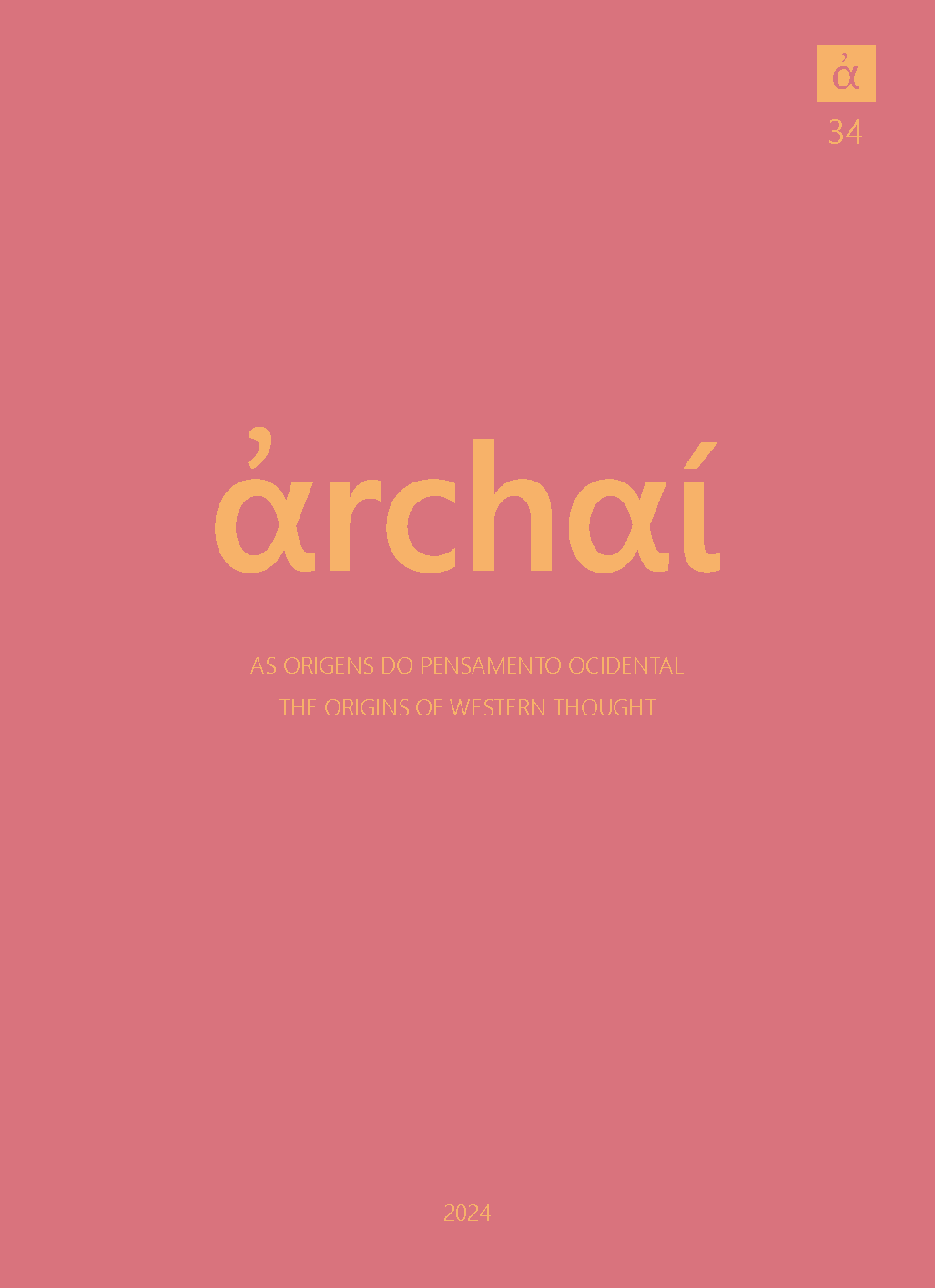Melissus’ and Zeno’s Deductive Speech
DOI:
https://doi.org/10.14195/1984-249X_34_09Palavras-chave:
Melissus, Zeno, style, deduction, reductioResumo
This paper explores the prosaic deductive style developed by Melissus and Zeno. It first emphasizes the authors’ use of a systematic and reduced vocabulary solely dedicated to a priori deduction. In a second time, the paper delves into the systematic role of reductio ad absurdum in their reasoning and distinguishes several kinds of reductio employed by the authors. Through this analysis, the study shows how Melissus and Zeno not only developed and systematized certain aspects of Parmenides’ style but also introduced original features that significantly influenced the philosophical writing style.
Referências
BARNES, J. (1982). The Presocratic Philosophers 2nd ed. London: Routledge & Kegan Paul.
BRÉMOND, M. (2017). Lectures de Mélissos Berlin: De Gruyter.
BURNET, J. (1892). Early Greek Philosophy London: Black.
CORDERO, N.-L. (1984). Les deux chemins de Parménide Paris/Bruxelles: Vrin/Éditions Ousia.
COXON, A. H. (2009). The Fragments of Parmenides: A Critical Text with Introduction, Translation, the Ancient Testimonia and a Commentary 2nd ed. Las Vegas: Parmenides Publishing.
DIELS, H.; KRANZ, W. (1951). Die Fragmente Der Vorsokratiker 6th ed. 3 vols. Berlin: Weidmann.
FINKELBERG, A. (1990). Studies in Xenophanes. Harvard Studies in Classical Philology, v. 93, p. 103-167.
GUTHRIE, W. K. C. (1965). A History of Greek Philosophy Vol. II. Cambridge: Cambridge University Press.
HARRIMAN, B. (2019). Melissus and Eleatic Monism Cambridge: Cambridge University Press .
KAHN, C. H. (1969). The Thesis of Parmenides. The Review of Metaphysics, v. 22, n. 4, p. 700-724. Philosophy Education Society Inc.
KIRK, G. S.; RAVEN, J. E.; SCHOFIELD, M. (1983). The Presocratic Philosophers: a Critical History with a Selection of Texts 2nd ed. Cambridge: Cambridge University Press .
KÖHLER, G. (2015). Zenon von Elea. Studien zu den ‘Argumenten gegen die Vielheit’ und zum sogenannten ‘Argument des Orts’ Berlin/Boston: De Gruyter.
LAKS, A.; MOST, G. W. (2016). Early Greek philosophy Vol. VI. Cambridge (Mass.): Harvard University Press.
LLOYD-JONES, H.; PARSONS, P. (eds.). (1983). Supplementum Hellenisticum Berlin: De Gruyter.
LOENEN, J. H. (1959). Parmenides, Melissus, Gorgias: A Reinterpretation of Eleatic Philosophy Assen: Van Gorcum.
MANSFELD, J. (2016). Melissus Between Miletus and Elea. In: PULPITO, M. (ed.). Melissus Between Miletus and Elea Sankt Augustin: Academia Verlag. p. 71-114.
McKIRAHAN, R. D. (1999). Zeno. In: LONG, A. A. (ed.). The Cambridge Companion to Early Greek Philosophy Cambridge/New York: Cambridge University Press. p. 134-158.
McKIRAHAN, R. D. (2008). Signs and Arguments in Parmenides B8. In: CURD, P.; GRAHAM, D. W. (eds.). The Oxford Handbook of Presocratic Philosophy Oxford/New York: Oxford University Press. p. 189-229.
PALMER, J. (2009). Parmenides and Presocratic Philosophy Oxford/New York: Oxford University Press .
RAPP, C. (2013a). Melissos Aus Samos. In: FLASHAR, H.; BREMER, D.; RECHENAUER, G. (eds.). Die Philosophie Der Antike Grundriss Der Geschichte Der Philosophie 1. Basel: Schwabe. p. 573-598.
RAPP, C. (2013b). Zeno Aus Elea. In: FLASHAR, H.; BREMER, D.; RECHENAUER, G. (eds.). Die Philosophie Der Antike Grundriss Der Geschichte Der Philosophie 1. Basel: Schwabe . p. 531-572
REALE, G. (1970). Melisso. Testimonianze e Frammenti Florence: La Nuova Italia.
SATTLER, B. M. (2021). Paradoxes as Philosophical Method and Their Zenonian Origins. Proceedings of the Aristotelian Society, v. 121, n. 2, p. 153-181. doi:10.1093/arisoc/aoab003.
» https://doi.org/10.1093/arisoc/aoab003
SEDLEY, D. (1999). Parmenides and Melissus. In: LONG, A. A. (ed.). The Cambridge Companion to Early Greek Philosophy Cambridge/New York: Cambridge University Press. p. 113-133.
SOLMSEN, F. (1971). The Tradition about Zeno of Elea Re-Examined. Phronesis, v. 16, n. 1, p. 116-141.
TOR, S. (2017). Mortal and Divine in Early Greek Epistemology: A Study of Hesiod, Xenophanes and Parmenides Cambridge: Cambridge University Press .
VLASTOS, G. (1975). Plato’s testimony concerning Zeno of Elea. The Journal of Hellenic Studies, v. 95, p. 136-162.
Downloads
Publicado
Edição
Seção
Licença
Copyright (c) 2024 Mathilde Brémond

Este trabalho está licenciado sob uma licença Creative Commons Attribution 4.0 International License.
Dado o acesso público desta revista, os textos são de uso gratuito, com obrigatoriedade de reconhecimento da autoria original e da publicação inicial nesta revista. O conteúdo das publicações é de total e exclusiva responsabilidade dos autores.
1. Os autores autorizam a publicação do artigo na revista.
2. Os autores garantem que a contribuição é original, responsabilizando-se inteiramente por seu conteúdo em caso de eventual impugnação por parte de terceiros.
3. Os autores garantem que a contribuição que não está em processo de avaliação em outras revistas.
4. Os autores mantêm os direitos autorais e concedem à revista o direito de primeira publicação, sendo o trabalho licenciado sob a Creative Commons Attribution License-BY.
5. Os autores têm permissão e são estimulados a publicar e distribuir seu trabalho on-line após a publicação na revista.
6. Os autores dos trabalhos aprovados autorizam a revista a, após a publicação, ceder seu conteúdo para reprodução em indexadores de conteúdo, bibliotecas virtuais e similares.
7. É reservado aos editores o direito de proceder ajustes textuais e de adequação do artigo às normas da publicação.



